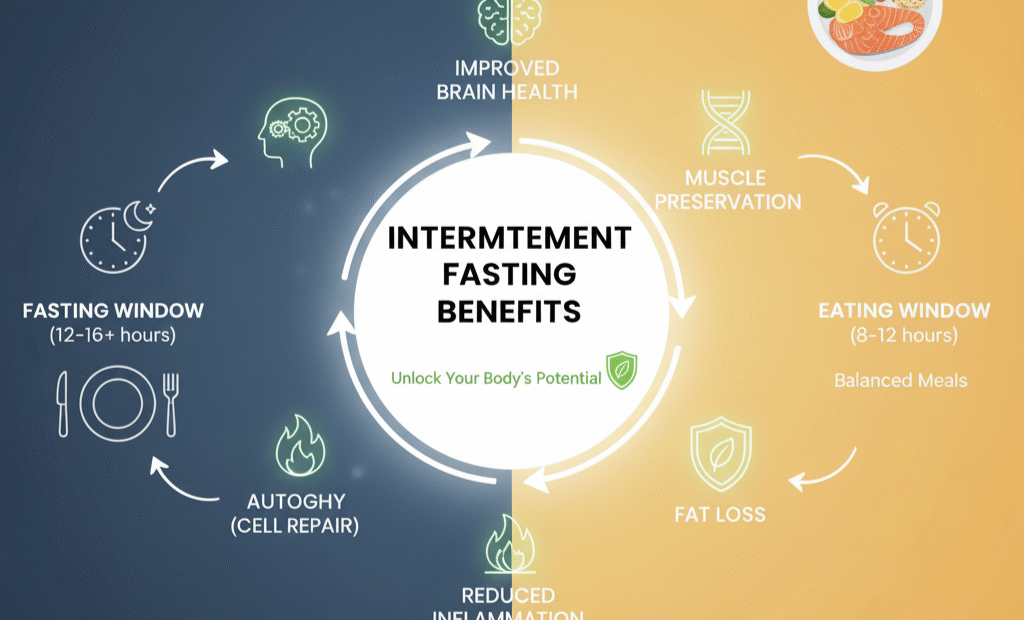Intermittent Fasting Benefits
Intermittent fasting has become one of the most popular lifestyle approaches in recent years. Unlike traditional diets that focus on what you eat, intermittent fasting focuses on when you eat. By cycling between periods of eating and fasting, you can improve metabolism, control weight, and enhance overall health. In this article, we’ll explore the key intermittent fasting benefits and why this simple strategy works for many people.
What is Intermittent Fasting?
Intermittent fasting (IF) is an eating pattern where you alternate between eating and fasting periods. The most common approaches include:
- 16/8 Method: Fast for 16 hours, eat within an 8-hour window.
- 5:2 Diet: Eat normally for 5 days, limit calories to 500–600 on 2 days.
- Alternate-Day Fasting: Fast or reduce calories every other day.
Unlike calorie-restricted diets, IF gives you flexibility in food choices while providing many health benefits.
Top Intermittent Fasting Benefits
1. Supports Weight Loss
One of the most common reasons people try intermittent fasting is to lose weight. By shortening your eating window, you naturally consume fewer calories. At the same time, fasting boosts metabolism and increases fat-burning hormones, helping your body use stored fat as energy.
2. Improves Insulin Sensitivity
Insulin plays a major role in blood sugar control. Intermittent fasting helps lower insulin resistance, making it easier for your body to process glucose. This lowers blood sugar levels and reduces the risk of type 2 diabetes.
3. Boosts Fat Burning
When you fast, your body shifts from using glucose as its main fuel to burning fat. This metabolic switch helps reduce belly fat, which is strongly linked to chronic diseases like heart disease and diabetes.
4. Promotes Brain Health
Fasting may improve memory and learning by increasing brain-derived neurotrophic factor (BDNF), a protein that supports brain function. It also lowers oxidative stress and inflammation, reducing the risk of neurodegenerative diseases.
5. Supports Heart Health
Heart disease is a leading cause of death worldwide. Intermittent fasting may help lower cholesterol, blood pressure, and triglycerides while reducing inflammation, all of which contribute to better heart health.
6. Encourages Longevity
Animal studies suggest fasting can extend lifespan by improving cellular repair and reducing inflammation. While human studies are ongoing, early results show IF supports long-term health and vitality.
7. Stimulates Cellular Repair
Fasting activates a process called autophagy, where your body removes damaged cells and regenerates healthier ones. This cellular “cleanup” reduces the risk of diseases like cancer and promotes healthy aging.
How to Start Intermittent Fasting
If you’re new to IF, start gradually with a 12-hour fasting window and increase to 14 or 16 hours as your body adapts. Drink water, coffee, or herbal tea during fasting hours to stay hydrated. When breaking your fast, focus on balanced meals with lean protein, healthy fats, and fiber-rich foods.
Who Should Avoid Intermittent Fasting?
Intermittent fasting isn’t suitable for everyone. Pregnant women, people with eating disorders, or those with medical conditions should seek professional advice before starting. Always listen to your body and adjust as needed.
Final Thoughts
Intermittent fasting is more than a weight-loss trend—it’s a sustainable lifestyle that can improve metabolic health, brain function, heart health, and longevity. By focusing on when you eat, you can unlock powerful intermittent fasting benefits and create lasting improvements in your well-being.









